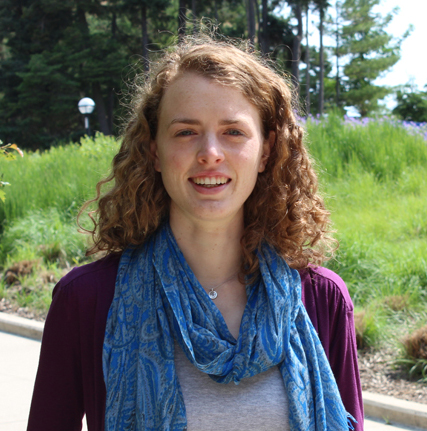Stephanie Crocker earns NSF Graduate Research Fellowship to bring sustainable energy to the grid
Stephanie seeks to provide continuous energy balancing on the grid by automatically controlling loads.

 Enlarge
Enlarge
Stephanie Crocker, a PhD student in Electrical and Computer Engineering, has been awarded an NSF Fellowship to support her work on integrating renewable energy sources into the power grid.
Working with Prof. Johanna Mathieu, Stephanie seeks to provide continuous energy balancing on the grid by automatically controlling loads. This must be done without disrupting customers and without compromising the grid’s physical integrity.
To operate reliably, the power grid requires a precise balance of energy supplied and energy demanded. As homes continue to rely more heavily on intermittent sources of energy like wind and solar, it becomes more challenging to keep the grid balanced. Instead of supply-side regulation, energy balancing could come from controlling the power usage of residential loads, such as air conditioners and refrigerators.
Stephanie’s goal is to develop control systems that both provide energy balancing to the grid via loads while managing the physical constraints of the grid’s distribution network.
“This research is definitely needed,” Stephanie says. “A lot of demand response research has just focused on modeling loads and developing control systems around them. But there’s a concern that if we don’t also include some constraints on the grid, then we might damage it.”
The grid’s physical constraints are generally not dealt with since they add complexity to the problem. More constraints make it harder to formulate a control problem that can be solved in real time while the grid is operating. But including these constraints is critical because, under the right circumstances, a surge in demand from many loads could cause the failure of the network’s “weakest link” component, such as thermal overloading of a transformer.
Stephanie proposes a two-part solution: the first step will be to identify the different potential causes of failure for the distribution network when loads are controlled to track signals; and the second step will be to create a computationally tractable control algorithm using a hierarchical control structure.
Stephanie comes to Michigan from Dartmouth College, where she studied EE. Rather than dive right into grad school, she spent a year working as a power electronics engineer for FINsix, a power electronics startup in California. Her industry experience also includes time as an intern for both Ekotrope, a Cambridge, MA company that optimizes home designs for energy efficiency, and Solaflect Energy, a Vermont-based company that develops low-cost designs for standalone solar PV trackers.
Stephanie looks forward to seeing her research tangibly impact society as she continues with this project and future smart grid work.
 MENU
MENU 
